|
TRANSLATE THIS ARTICLE
Integral World: Exploring Theories of Everything
An independent forum for a critical discussion of the integral philosophy of Ken Wilber
  Frank Visser, graduated as a psychologist of culture and religion, founded IntegralWorld in 1997. He worked as production manager for various publishing houses and as service manager for various internet companies and lives in Amsterdam. Books: Ken Wilber: Thought as Passion (SUNY, 2003), and The Corona Conspiracy: Combatting Disinformation about the Coronavirus (Kindle, 2020). Frank Visser, graduated as a psychologist of culture and religion, founded IntegralWorld in 1997. He worked as production manager for various publishing houses and as service manager for various internet companies and lives in Amsterdam. Books: Ken Wilber: Thought as Passion (SUNY, 2003), and The Corona Conspiracy: Combatting Disinformation about the Coronavirus (Kindle, 2020). 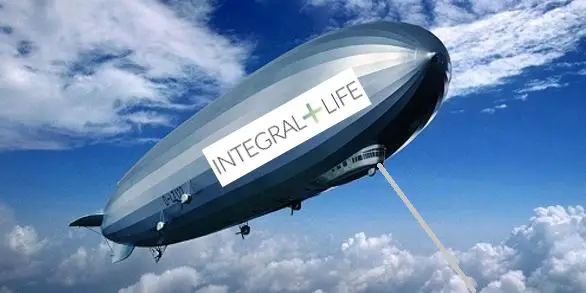 The Integral ZeppelinAn Open Letter to Ken WilberFrank Visser
Rather than seeing these critical readings as attacks it would be more productive to see them as challenges that need to be met.
Since writing Ken Wilber: Thought as Passion (SUNY, 2003) our paths have diverged considerably, me taking a more rational-critical look at Integral Theory. Integral World, which started out as a fan-site in 1997, has hosted a wide variety of criticisms raised by over one hundred authors. These have not elicited any substantial responses from integral corners. Frankly, this defensiveness and non-responsiveness have always surprised me. Rather than seeing these critical readings as "attacks" that need to be defended against, it would be more productive to see them as "challenges" that need to be met, by a philosophy that claims to be on top of things scientific. Since I don't expect a different kind of response any time soon, I would like to summarize a few points of contention and suggest a way out of this impasse. Entropy
This statement sets your system apart from the bulk of settled science, and it need not be that way.
On various occasions you have expressed your exasperation with the Second Law of Thermodynamics, which states that the universe is heading for a uniform state of equilibrium.[1] In A Theory of Everything you have countered: "Yet simple observation tells us that, in the real world, life creates order everywhere: the universe is winding up, not down."[2] But simple observation tells us that the earth is flat and that the sun rises in the morning. That is simply not enough. This statement sets your system apart from the bulk of settled science, and it need not be that way. Even though the Second Law might hold true to the very end of the universe, something else is going on that can explain the emergence of complexity. Gravity has created galaxies and stars, which in turn have created heavy elements, the simplest of which have become the building blocks of life. There is no need whatsoever to deny the validity of the Second Law. It would be wise to take heed of Sir Arthur Eddington's famous remark: The law that entropy always increases—the second law of thermodynamics—holds I think, the supreme position among the laws of Nature. If someone points out to you that your pet theory of the universe is in disagreement with Maxwell's equations—then so much worse for Maxwell equations. If it is found to be contradicted by observation—well these experimentalists do bungle things sometimes. But if your theory is found to be against the second law of Thermodynamics, I can give you no hope; there is nothing for it but to collapse in deepest humiliation.[3] Most importantly, gradients have been set up this way that evolving life learned to feed and thrive on. So against a background of growing entropy (disorder), local pockets of order have been created by naturalistic means. This paradox seems lost on you, but is crucial to integrate science into your integrative system. Contrary to "your pet theory of the universe", complexity science is not your ally, because it shows what Nature can do all on its own. No help from Spirit is needed for that.
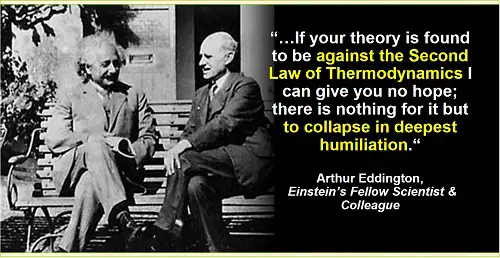 Evolution
It just turns out that random mutation alone doesn't have to do all the heavy lifting in nature.
The topic of evolution has been at the center of your mind over four decades. However, your interpretation differs from the scientific understanding in that you see it as a spiritual process>, in which evolution is "Spirit-in-action", both in nature and culture (as you demonstrated in your recent book about Donald Trump). You have argued for this spiritual view of evolution by downplaying the ability of science, most notably neo-Darwinism, to explain the complexities of biological life. You have often pointed to Stuart Kauffman as a potential ally, who has criticized neo-Darwinism for overlooking a major source of "order for free", viz. self-organization. You have co-opted this concept to fit your involution/evolution cosmological scheme, as if self-organization is driven by immanent Spirit. However, complexity scientists have no need for such a spiritual hypothesis to explain the phenomena of self-organization at all. Kauffman explicitly distanced himself from this creationist or spiritualist view: In this scientific world view, we can ask: Is it more astonishing that a God created all that exists in six days, or that the natural processes of the creative universe have yielded galaxies, chemistry, life, agency, meaning, value, consciousness, culture without a Creator. In my mind and heart, the overwhelming answer is that the truth as best we know it, that all arose with no Creator agent, all on its wondrous own, is so awesome and stunning that it is God enough for me and I hope much of humankind.[4] There is every reason to widen the scope of evolutionary theory, beyond the confines of neo-Darwinism, but introducing Spirit into the picture is not the way to go. Many complementary approaches, such as evo-devo (Carroll), endosymbiosis (Margulis) and horizontal gene transfer (Quammen) have only provided more sources of variation for selection to work on. It just turns out that random mutation alone doesn't have to do all the heavy lifting in nature. Suggesting that the shortcomings of neo-Darwinism somehow provide support for a spiritual worldview is an ill-informed creationist strategy you seem to happily subscribe to. Rephrasing Spirit as "intra-natural" or "immanently natural" doesn't make it less Spirit.[5] But Spirit doesn't explain the origin or evolution of life—it adds more questions than it solves. 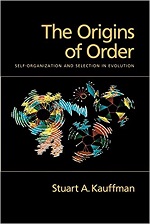 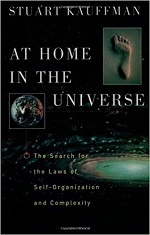 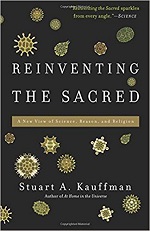
Kauffman: “...the truth as best we know it, that all arose with no Creator agent, all on its wondrous own, is so awesome and stunning that it is God enough for me...”
When pressed for an answer, you once clarified your postion as follows: Do I think Mayr or Dawkins or Lewontin or Kauffman believe in telos or Eros that is Spiritual in any way? Absolutely not. Virtually all mainstream theorists embrace scientific materialism. I am simply saying that most mainstream biologists accept that there are problems and issues at the leading edge of their science, and I am saying that I recognize the same leading-edge problems that they do, but at that point we quickly part ways—virtually all of them believe those issues can be fully solved using scientific materialism, and I of course do not accept that...[6] So, by your own admission, no biologist of fame subscribes to your pet theory of evolution. How does that feel? Would such a position really help science solve any of the "problems and issues at the leading edge" of biology? I don't think so. Isn't it essential to science that this leading edge continuously recedes back like a horizon, the more science proceeds? Leading-edge problems are there to be resolved by science. Colors
Your new color palette is heavily biased towards the reddish colors, and lacks even two of the primary colors.
On a lighter note, about a decade ago you changed the color scheme of Spiral Dynamics, by replacing half of the colors. In your recent book The Religion of Tomorrow (2017) you accounted for this change by claiming that a color sequence that was more aligned with nature's color spectrum was "a more adequate spectrum", that was in line with the energetic characteristics of the universe. However, your new color palette is heavily biased towards the reddish colors, and lacks even the primary colors blue and yellow. As I summarized my findings in a longread on Integral World:[7] : Compared to SD and the yoga/tantra model the colors of Wilber's model are less distinct and informative, especially in the personal stages. The primary colors Yellow and Blue are absent, and Reddish colors are way too prominent, in Ken Wilber's new color scheme. The disproportional preponderance of reddish colors in this lower part (covering 4,5 chakras!) is a point of concern, both from the standpoint of color psychology and from the perspective of esoteric tantric subtle energy doctrines. As it stands now, Wilber's new color scheme is neither evocative nor accurate. Since the choice of colors in your philosophy matters, and is not a purely arbitrary exercise, it seems to me that it really needs to match the color spectrum, instead of being an awkward hybrid between the original Spiral Dynamics colors and the rainbow spectrum. Following simple color psychology, this system can evolve into "an even more adequate spectrum". Fortunately, instead of jettisoning the primary colors Yellow and Blue, as you have done, they can be re-introduced fairly easily (Table 1):
These examples illustrate in my opinion your problematic engagement with the findings of science. Integral Theory looks very much like a zeppelin to me, which impressively floats in the air, but has a very tenuous connection to the ground. Integral Theory primarily deals with spirituality, individual and cultural development, and that's fine, but when it touches on science, it overreaches its competence. In the meantime, the integral zeppelin moves on, into unknown destinations. I am looking forward to any response from integral quarters that deals in detail with these concerns. Wouldn't that be a normal procedure in any intellectual enterprise? In fact, isn't such an exchange of arguments long overdue? NOTES[1] "And the whole notion of the universe as 'running down' is ridiculous. I mean, it is NOT! ... It is not a universe becoming more and more dispersed and separated and isolated. It is a universe coming together in higher and higher wholes" ("Integral in Action with Ken Wilber", October 10th, 2015, Conscious 2) [2] The full quote reads: "The second law of thermodynamics tells us that, in the real world, disorder always increases. Yet simple observation tells us that, in the real world, life creates order everywhere: the universe is winding up, not down. (A Theory of Everything, 2000, p. x) [3] Sir Arthur Eddington, The Nature of the Physical World. Maxmillan, New York, 1948, p. 74. [4] Stuart A. Kauffman, Preface to "Beyond Reductionism: Reinventing the Sacred", 11.12.06, www.edge.org. [5] "You either postulate a supernatural source of which there are two types. One is a Platonic given and one is basically theological—a God or Intelligent Design—or you postulate Spirit as immanent—of course it's transcendent but also immanent—and it shows up as a self-organizing, self-transcending drive within evolution itself. And then evolution is Spirit's own unfolding. Not a super-natural, but an intra-natural, an immanently natural aspect. And that's basically the position I maintain." ("Ken Responds to Recent Critics", www.kenwilber.com, 2006 (audio file). [6] Wilber, K. (2006b). "Take the Visser Site as Alternatives to KW, but Never as the Views of KW", www.kenwilber.com, June 27, 2006. The blog post Wilber comments on is: Jim Chamberlain, "Wilber on Evolution: A Few Comments", www.integralworld.net, June 2006. [7] Frank Visser, "A More Adequate Spectrum of Colors? A Comparison of Color Terminology in Integral Theory, Spiral Dynamics and Chakra-Psychology", Review of "The Religion of Tomorrow", Part III, www.integralworld.net, 2017.
| ||||||||||||||||||||||||||||||||